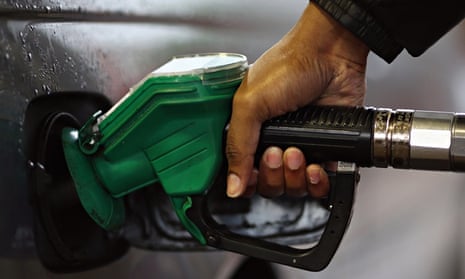Christmas came early for drivers this year, with a steady fall in the price at the pump of 15p a litre since the summer. Underlying the cheaper petrol is a mighty oil crash, with the price of a barrel of Brent crude near halving, from $116 in June to a mere $63 on Friday night. The frightening exposure of the big oil producers is on plain view in Russia, but – in years gone by – the oil-importing western economies as a whole would, like cheering motorists on forecourts, have regarded cheap fuel as an unalloyed boon.
This time, however, a decidedly uneasy air surrounds oil’s big dip. At first blush, this seems baffling. Oil’s ups and downs have reliably given rise to an equal and opposite swing in the mood of industry. All three late 20th-century slumps – 1974, 1980-81 and 1990-91 – followed hot on the heels of costlier crude. Less often stressed is the way that oil’s great reverses have pumped fuel into the economic engine. Britain credits (or blames) its then-chancellor’s policies for its rapid late 1980s expansion with the phrase “Lawson boom”, but the effective collapse of the Opec cartel’s discipline and the associated halving of the crude price in 1986 was just as important. For all the new-age talk about living on thin air in the late 1990s, the dotcom boom got going amid another glut of the gloop that lubricates western prosperity.
History, then, points to cheaper oil being a pedal pressed to the metal, a potential means of the world finally putting some pace into the less-than-great recovery that has followed the Great Recession. The IMF is just one voice that takes this conventional view. Optimists point to the rising role of shale gas in reducing America’s addiction to imported oil. Industry experts have been saying that shale would prove a game-changer for many years now, but – on this sunny reading – what’s recently changed is that the markets are finally paying attention. As they grasp that unpromising rocks can sometimes contain as much locked-up energy as oil wells, the perennial panic about imminent “peak” oil production recedes, and there is less reason to indulge in speculative stock-piling. Supply floods back into the market, prices drop and the economy should begin to hum.
The more anxious interpretation starts by suggesting a different root cause – demand instead of supply. Oil has dipped 40%, pessimists fear, because the world no longer expects a return to economic full pelt, as that used to be understood before the crisis, nor to the growing appetite for hydrocarbons that used to go with it. Europe, Japan and – relative to its own vigorous standards – China, have all been looking anaemic this year. Like low blood pressure after a heart attack, then, cheap oil should arguably be regarded not as a sign of rude health, but rather as a consequence of malaise. In the eurozone especially, where price rises of a mere 0.3 percentage points now separate a continent and deflation, any further falls in energy costs could make the difference.
Once prices are sinking, the dynamics are singularly hard to arrest. Shoppers keep their wallets closed in the hope of a better bargain next week, and fixed cash debts weigh increasingly heavily on families and on firms investing in useful things. With interest rates already rock-bottom, and political obstacles ranged in the way of more creative solutions, Europe could potentially sink deep into a deflationary quagmire. Cheap oil would then have proved to be not merely a symptom of weakness, but a contributor to it as well.
Important as the economic consequences could be, the environmental effects could be more profound. The burning question for the climate is whether we can agree to leave half the world’s oil and gas in the ground, as we must if we are to avoid ruinous warming. Price-induced cut-backs in oil investment should leave more crude being locked up for longer; lower fuel costs also provide an opportune moment for emerging states to ditch their pay-the-polluter energy subsidies.
So for the environment, as for the economy, not all the news is bad. But there is a more immediate question, too. With oil so much cheaper, will we be able to resist squandering more of it – through carefree flying, a lazy refusal to switch things off and indulgence in souped-up cars? If not, the ambiguous economics of oil’s big dip will be as nothing compared to the uncertainties let rip on our planetary home.




